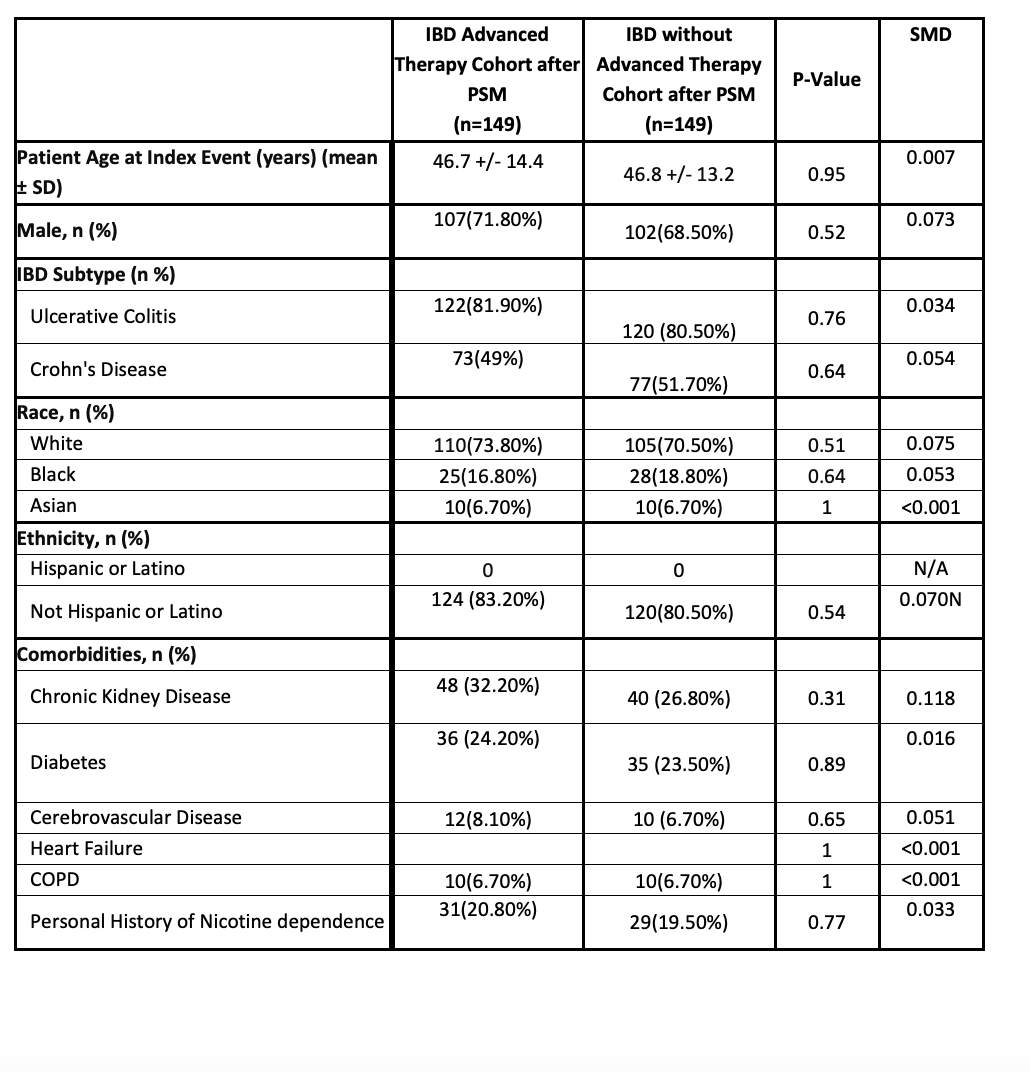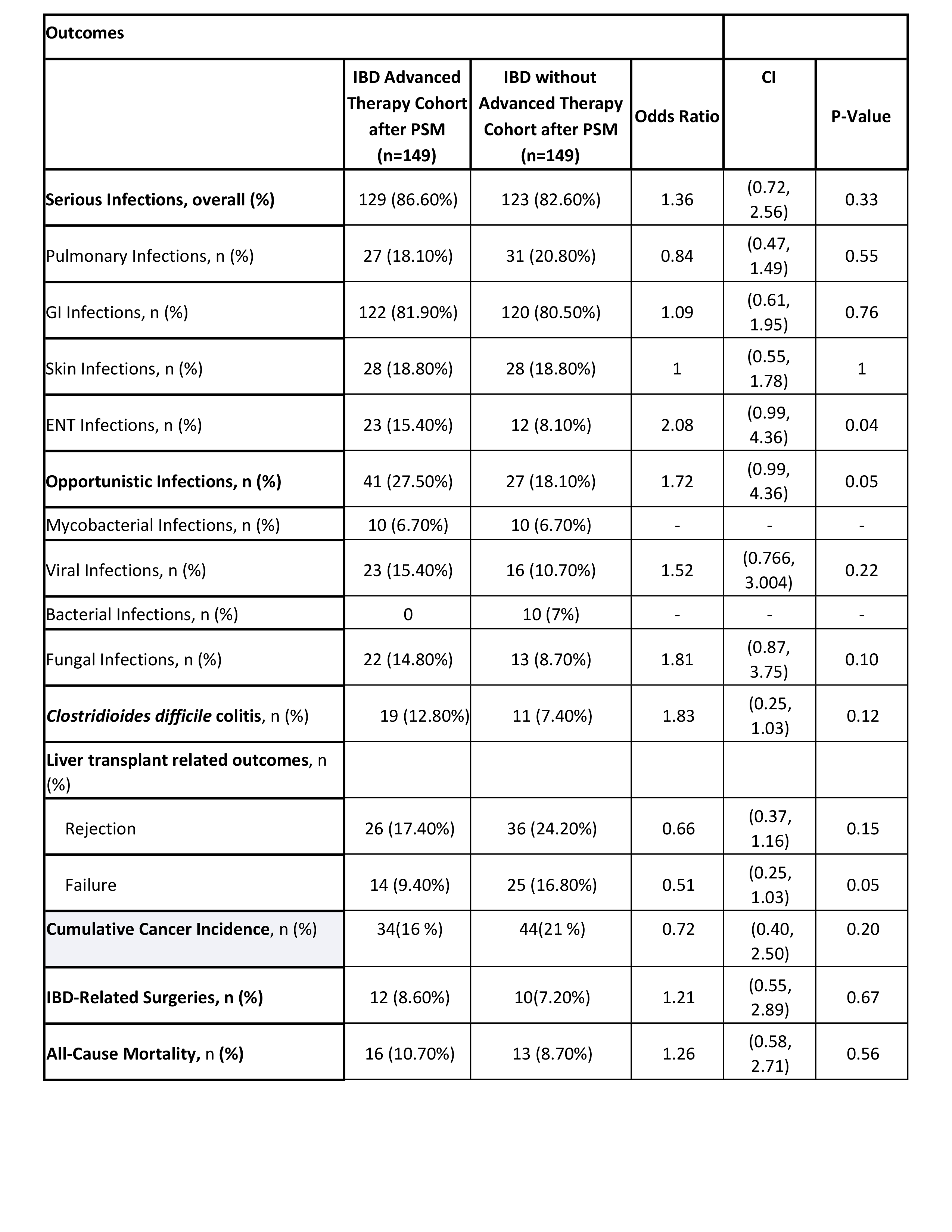Sunday Poster Session
Category: IBD
P1043 - Impact of Advanced Therapy on Safety and Outcomes in Patients With Inflammatory Bowel Disease and Primary Sclerosing Cholangitis After Liver Transplantation
Sunday, October 26, 2025
3:30 PM - 7:00 PM PDT
Location: Exhibit Hall
- AK
Avleen Kaur, MD (she/her/hers)
SUNY Upstate Medical University
Syracuse, NY
Presenting Author(s)
Avleen Kaur, MD1, Shefali Mody, MBBS2, Idan Goren, MD1, Rachel Chernet, MD2
1SUNY Upstate Medical University, Syracuse, NY; 2SUNY Upstate Medical University Hospital, Syracuse, NY
Introduction: Primary sclerosing cholangitis (PSC) accounts for approximately 5% of liver transplants (LTs) annually in the United States, and most PSC patients have concurrent inflammatory bowel disease (IBD-PSC). Managing IBD-PSC after LT is challenging due to the need to balance immunosuppression and IBD therapy. This study evaluates the safety and outcomes of advanced IBD therapies (AT) in IBD-PSC patients following LT.
Methods: We identified IBD-PSC patients from the TriNetX database who underwent LT and were maintained on anti-rejection therapy (ART), with or without additional AT. Outcomes were assessed over five years, comparing patients with and without AT, before and after propensity score matching (PSM). Primary outcomes included incidence of serious and opportunistic infections, IBD-related surgeries, and cancer. Secondary outcomes included liver-related complications and all-cause mortality.
Results: Among 549,944 IBD patients, 765 had IBD-PSC and underwent LT. Of these, 178 received AT post-LT and 587 received ART alone. The most common ATs were vedolizumab (45%), ustekinumab (30%), and anti-tumor necrosis factor-alpha agents (26%). Prior to matching patients receiving AT had higher rates of intestinal infections (21.90% vs. 13.30%, p=0.005) and Clostridiodes difficile enterocolitis (12.90% vs. 7.70%, p=0.03). After PSM, serious and opportunistic infections were similar between groups. However, intestinal infections (20.80% vs. 11.40%, p=0.02) and other viral infections (21.50% vs. 12.10%, p=0.03) remained more common in the AT group. No significant differences were found in IBD surgeries, cancer, graft rejection and failure, or all-cause mortality.
Discussion: Advanced IBD therapies are generally safe in IBD-PSC patients post-LT, with vedolizumab and ustekinumab being the most commonly used agents.

Figure: Baseline characteristics of patients with and without exposure to advanced therapy after
propensity score matching. Abbreviation: SMD-standard mean difference, PSM-propensity score
match, IBD-inflammatory bowel disease, COPD-chronic obstructive pulmonary disease.

Figure: Comparison of outcomes between patients with and without exposure to advanced therapy after propensity score matching. Abbreviation: PSM-Propensity Match, IBD-inflammatory bowel disease, ENT-Ear Nose Throat, CI-confidence interval.
Disclosures:
Avleen Kaur indicated no relevant financial relationships.
Shefali Mody indicated no relevant financial relationships.
Idan Goren indicated no relevant financial relationships.
Rachel Chernet indicated no relevant financial relationships.
Avleen Kaur, MD1, Shefali Mody, MBBS2, Idan Goren, MD1, Rachel Chernet, MD2. P1043 - Impact of Advanced Therapy on Safety and Outcomes in Patients With Inflammatory Bowel Disease and Primary Sclerosing Cholangitis After Liver Transplantation, ACG 2025 Annual Scientific Meeting Abstracts. Phoenix, AZ: American College of Gastroenterology.
1SUNY Upstate Medical University, Syracuse, NY; 2SUNY Upstate Medical University Hospital, Syracuse, NY
Introduction: Primary sclerosing cholangitis (PSC) accounts for approximately 5% of liver transplants (LTs) annually in the United States, and most PSC patients have concurrent inflammatory bowel disease (IBD-PSC). Managing IBD-PSC after LT is challenging due to the need to balance immunosuppression and IBD therapy. This study evaluates the safety and outcomes of advanced IBD therapies (AT) in IBD-PSC patients following LT.
Methods: We identified IBD-PSC patients from the TriNetX database who underwent LT and were maintained on anti-rejection therapy (ART), with or without additional AT. Outcomes were assessed over five years, comparing patients with and without AT, before and after propensity score matching (PSM). Primary outcomes included incidence of serious and opportunistic infections, IBD-related surgeries, and cancer. Secondary outcomes included liver-related complications and all-cause mortality.
Results: Among 549,944 IBD patients, 765 had IBD-PSC and underwent LT. Of these, 178 received AT post-LT and 587 received ART alone. The most common ATs were vedolizumab (45%), ustekinumab (30%), and anti-tumor necrosis factor-alpha agents (26%). Prior to matching patients receiving AT had higher rates of intestinal infections (21.90% vs. 13.30%, p=0.005) and Clostridiodes difficile enterocolitis (12.90% vs. 7.70%, p=0.03). After PSM, serious and opportunistic infections were similar between groups. However, intestinal infections (20.80% vs. 11.40%, p=0.02) and other viral infections (21.50% vs. 12.10%, p=0.03) remained more common in the AT group. No significant differences were found in IBD surgeries, cancer, graft rejection and failure, or all-cause mortality.
Discussion: Advanced IBD therapies are generally safe in IBD-PSC patients post-LT, with vedolizumab and ustekinumab being the most commonly used agents.

Figure: Baseline characteristics of patients with and without exposure to advanced therapy after
propensity score matching. Abbreviation: SMD-standard mean difference, PSM-propensity score
match, IBD-inflammatory bowel disease, COPD-chronic obstructive pulmonary disease.

Figure: Comparison of outcomes between patients with and without exposure to advanced therapy after propensity score matching. Abbreviation: PSM-Propensity Match, IBD-inflammatory bowel disease, ENT-Ear Nose Throat, CI-confidence interval.
Disclosures:
Avleen Kaur indicated no relevant financial relationships.
Shefali Mody indicated no relevant financial relationships.
Idan Goren indicated no relevant financial relationships.
Rachel Chernet indicated no relevant financial relationships.
Avleen Kaur, MD1, Shefali Mody, MBBS2, Idan Goren, MD1, Rachel Chernet, MD2. P1043 - Impact of Advanced Therapy on Safety and Outcomes in Patients With Inflammatory Bowel Disease and Primary Sclerosing Cholangitis After Liver Transplantation, ACG 2025 Annual Scientific Meeting Abstracts. Phoenix, AZ: American College of Gastroenterology.
